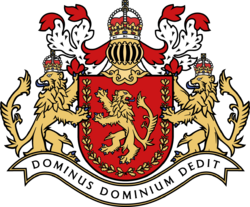Government of Great Nortend
His Majesty's Government | |||||||
|---|---|---|---|---|---|---|---|
 | |||||||
| Part of a series on the Government of Great Nortend | |||||||
| The Crown | Alexander II | ||||||
| |||||||
The Government of Great Nortend, formally known as His Majesty's Government or in Court Latin Curia Regis, and also known as the Erbonian Government, the Nortish Government or in some contexts, the Crown, constitutes the government of the Kingdom of Nortend, Cardoby and Hambria, a 'semi-constitutional' mixed monarchy where the Sovereign, presently Alexander II, wields ultimate power delegated to the Curia Regis consisting of the various branches of government.
The Government is split nominally into three branches: the executive branch composed of the Privy Council, which advises the Sovereign and whose role is mainly delegated to the Cabinet and Ministry, led by the Lord High Treasurer; the legislative branch composed of the Parliament's House of Lords, House of Clergy, House of Burgesses, House of Knights; the judicial branch composed of the various civil, regular and ecclesiastical courts, wardens, judges and justices. However, there is no formal separation of powers, with the consequence being that many offices and institutions have roles in two or even all three of the branches. Examples include Parliament, which has judicial and legislative powers and the Privy Council, which has executive, legislative and judicial powers.
The Crown
The Crown (Court Latin: Illud Regnum), represented physically by the Sovereign, is the sovereign superior over all of Great Nortend, being considered the feudal liege lord, and ecclesiastical ruler appointed by God over his subjects. It has been held by members of the House of Anthord since 1519, with a brief interlude from 1762 to 1777.
The current Sovereign is Alexander II. The heir apparent (regulus apparens) is William, Prince of Rhise.
The Crown, in its various forms, is the head of the Curia Regis, and the fount of all government power and is thus technically the 'head of government'. It has the final say in all executive, judicial and legislative matters, specifically in the guises of His Majesty in camera in executive and judicial matters, and His Majesty in parlamento in legislative matters.
Privy Council
The Privy Council comprises His Majesty's ministers, clerks and counsellours who have the formal role of advising the Sovereign on matters of governance. Counsellours are entitled to the style of 'The Right Honourable'.
From the Privy Council are drawn the Officers of State and Cabinet. Junior ministers are not usually made Privy Counsellours. The most important of the ministers of the Crown (minister regni) is the Lord High Treasurer, who serves as de facto Prime Minister primus inter pares, though in ceremonial contexts the Lord High Steuard ranks first.
Cabinet
The Cabinet serves as the main decision-making body of the Erbonian Government. It is constituted as a committee of the Privy Council, and by convention includes only those members thereof currently sitting in Parliament or entitled to do so. The Cabinet is headed by the Lord High Treasurer, primus inter pares holding the informal position of Prime Minister.
The Officers of State hold seats in Cabinet ex officio; however, it is rare for the Lords High Steuard, Admiral, Constable and Chamberlain to sit in Cabinet meetings, owing to their mostly ceremonial or administrative roles. Most Orders in Council of the Privy Council are made with the presence of at least one Cabinet member.
Not all cabinet members head a government ministry. In particular, the masters and lord masters of several important government boards do not head ministries, yet still form part of the Cabinet.
Utter Ministry
The Utter Ministry comprises of junior Ministers of the Crown who are not entitled to sit in Cabinet yet still form part of the serving government. As they are not members of Cabinet, they do not ex officio receive membership of the Privy Council. However, some junior ministers are nonetheless Privy Counsellours.
Legislature
The main legislature of Great Nortend is the Parliament of Great Nortend. The Parliament is a quadcameral legislature, with four formal chambers. In practice however, the House of Lords and the Houses of Commons, the latter comprising the formally separate House of Burgesses and House of Knights, effect a standard bicameral system. The ecclesiastical House of Clergy or Proctors only rarely meets and is often considered to be separate from the main secular Parliament, though Lords Spiritual do sit in the House of Lords.
Judiciary
Ministries
A ministry is a office of the Curia Regis headed by a minister of the Crown who is appointed by the Sovereign in camera. Ministers are always Privy Counsellours, whence they derive their name.
Presently, there are nine ministries in His Majesty's Government. The list does not include offices and boards subordinate to another ministry, such as the Board of Railways or the Board of Agriculture. It also does not include non-ministerial departments, such as the Lord High Treasurer's Office or departments unconnected to government.
This page is written in Erbonian English, which has its own spelling conventions (colour, travelled, centre, realise, instal, sobre, shew, artefact), and some terms that are used in it may be different or absent from other varieties of English. |

